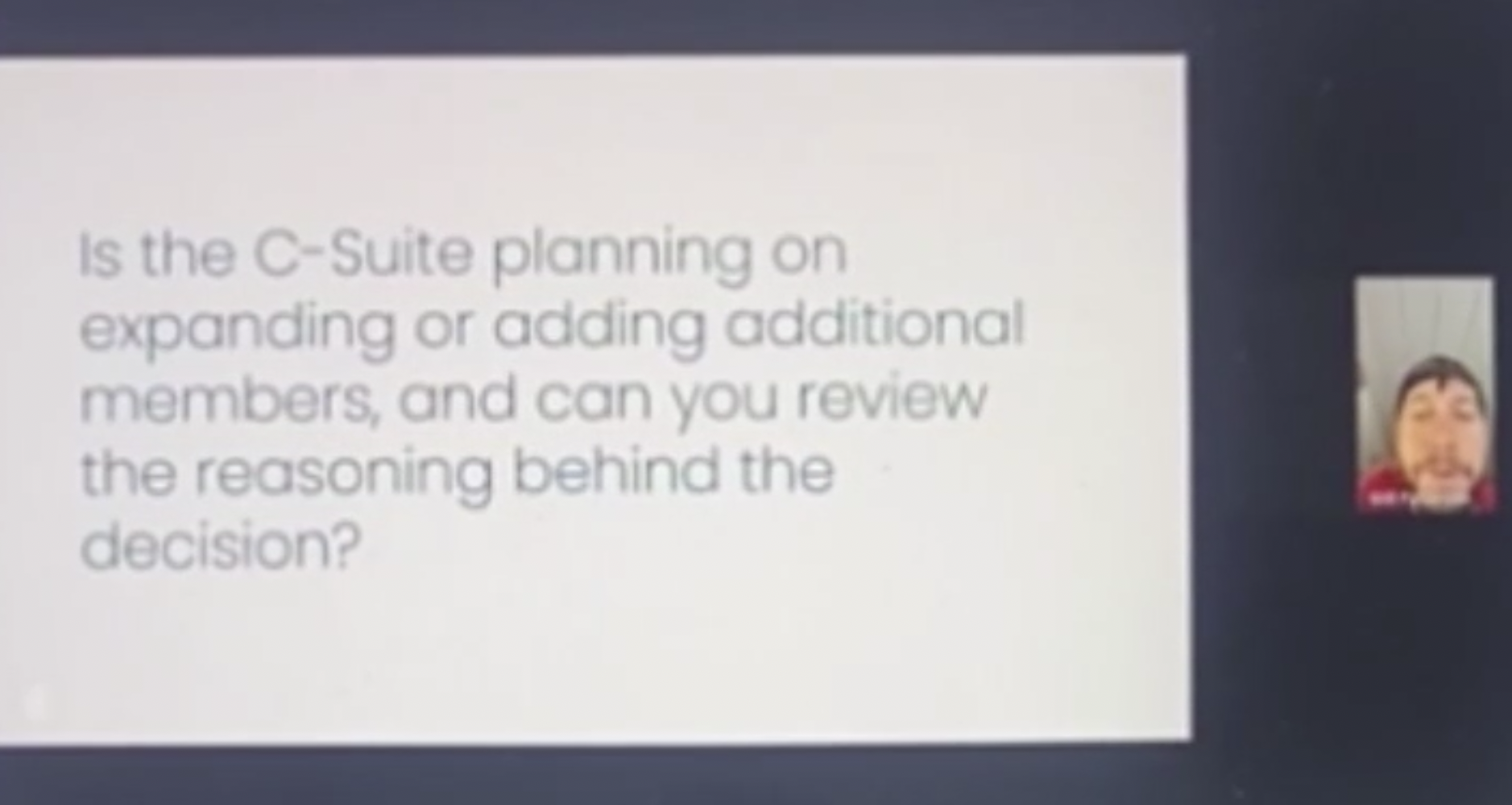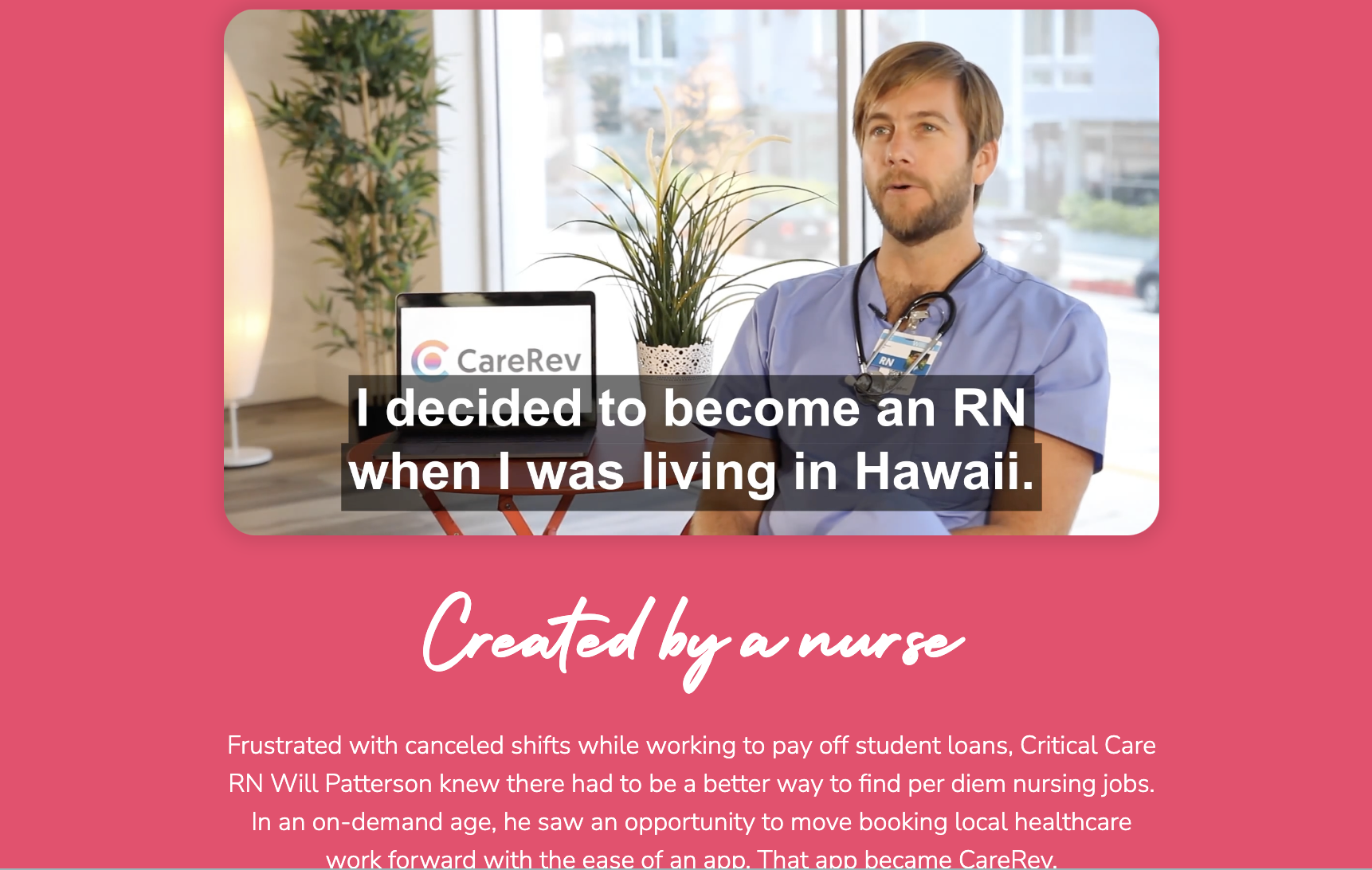
A Long, Strange Trip for the ‘Uber for Nurses’
Allegations of drug use, lax vetting of nurses and a stumbling business encircle CareRev, a hospital-staffing startup that raised $100 million during the pandemic. Last week, CEO Will Patterson resigned after inquiries from The Information.
Will Patterson was on a hot streak. As the co-founder and CEO of CareRev—a gig-work platform sometimes described as an “Uber for nurses”—he saw his company’s business surge during the pandemic as hospitals and clinics scrambled to find healthcare workers. In late 2020, he seized the moment by pitching investors over Zoom about his vision for marrying technology and healthcare, ultimately nabbing $50 million for a Series A round.
He was also on LSD, Patterson later revealed to colleagues.
Before at least one of the meetings, he had taken small amounts of the psychedelic drug to “expand” his mind, Patterson told a group of CareRev employees during a business dinner in early 2022, according to two people who were present. Microdosing of drugs like LSD—a practice that stops short of delivering full-blown psychedelic trips—has become popular among people who believe it boosts their mood and creativity in social and professional settings, though using LSD is illegal under U.S. law and in nearly every state.
The Takeaway
- CareRev Founder told colleagues he pitched VCs while microdosing LSD
- Former CEO resigned after inquiries from The Information
- Former employees accused startup of lax vetting of nurses
Powered by Deep Research
Current and former CareRev employees have also accused Patterson, 40, of openly discussing his drug use in front of them and, in one instance, urging employees to try LSD and cannabis, according to a person who witnessed this. At the same time, CareRev has in some cases allowed healthcare professionals with criminal records to obtain work through its platform in violation of state laws, according to three former employees. At one point, Patterson proposed staffing nursing jobs with “homeless people,” they said.
On Friday—a week after The Information contacted CareRev about Patterson’s conduct—the company announced that Patterson was stepping down as CEO, and will be replaced by Brandon Atkinson. Atkinson joined CareRev as chief operating officer a few weeks ago, according to a current employee.
“You all met Brandon Atkinson last week during our All Hands, but after continued conversations with him over the last couple of months, we have decided that he will take on the role of CEO, while I will step aside to support as senior advisor,” Patterson wrote in an email sent late Thursday night pacific time to CareRev employees announcing the transition, which was viewed by The Information.
In a company meeting Friday, Atkinson said Patterson’s departure was hastened by The Information’s reporting, according to a person familiar with his comments.
In a statement responding to a series of questions for this article, a spokesperson for CareRev didn’t address questions about Patterson’s claims of drug use. The spokesperson said Patterson’s comments about employing homeless people had been mischaracterized. She said CareRev couldn’t confirm or deny the specific allegations concerning the company’s vetting process but noted that “CareRev meets industry best practices.”
She didn’t make Patterson available for an interview about this article.
Prior to the announcement of Patterson’s departure from CareRev, an attorney representing him sent The Information a letter Thursday night denying most of the allegations in this article.

During the initial meetings with investors, when Patterson said he was microdosing LSD, the CEO handled one part of the presentation—detailing how he, a former registered nurse, had founded CareRev—while other executives went over the nitty-gritty of the company’s financial performance and recent deals with healthcare clients, according to a person briefed on the matter. After colleagues told him he was rambling during his part of the presentation, Patterson told them he was happy with his performance and conducted the rest of the pitch meetings on his own, the person said.
When reached by phone last Thursday before Patterson’s departure from the company was announced, one CareRev investor said he wasn’t concerned about Patterson telling employees that he was microdosing during the late 2020 pitch meetings. “That would literally be at the very bottom of the list of things that I’m worried about,” said Zach Coelius, who participated in CareRev’s Series A fundraising round and an earlier seed round.
Patterson's conduct—details of which are reported here for the first time—apparently did not rouse the suspicions of investors, who continued to shower CareRev with funding. Following the Series A round, he raised an additional $50 million in a subsequent round about a year later, which valued CareRev at $600 million, including the money invested, according to data from PitchBook.
That was a stellar sum for a company that had raised a mere $120,000 between its founding in 2015 and the start of the pandemic. CareRev’s investors include Y Combinator, Tribe Capital, CSC UpShot Ventures, Industry Ventures and Transformation Capital—a growth equity firm spun out of Silicon Valley Bank in 2019—which is helmed by former Bain Capital Ventures partner Jared Kesselheim.
Then again, it was also a golden age for startup founders. Venture capitalists were showering record amounts of cash on entrepreneurs, including on founders capitalizing on pandemic-era changes in business and consumer behavior they believed would last forever.
The frenetic pace of dealmaking led many investors to skimp on due diligence—a once essential part of the investing process that typically involves investigating a startup’s business practices and its leaders’ backgrounds—in order to be the first firm to offer promising companies a term sheet. By mid-2021, it had become increasingly common for investors to skip background checks for startup CEOs.
Even before the pandemic turned everything on its head, healthcare technology had developed something of a Wild West reputation, with more than its share of miscreants. There was Elizabeth Holmes, founder of blood-testing startup Theranos, which collapsed in 2018. She was convicted of fraud and began serving an 11-year-plus sentence in federal prison late last month. And in April, a federal jury convicted Rishi Shah, a co-founder and former CEO of Outcome Health, a Chicago-based health technology startup company, and two other executives in a $1 billion fraud case for misdeeds that took place between 2011 and 2017.
But those cases did little to diminish the buzz around healthcare startups like CareRev, which have pledged to bring new digital efficiencies to the stodgy, technologically backward world of healthcare. In 2021, U.S.-based startups in that category raised a total of $86 billion, up 59% from 2020, according to PitchBook. During the pandemic, as hospitals saw their beds overflow with patients and burnout drove staffers from the profession, Los Angeles–based CareRev became a hot commodity.
Behind the scenes, though, the company had a history of questionable business practices, current and former employees say. CareRev, without admitting wrongdoing, recently agreed to pay $1 million to settle a class-action suit alleging that it had misclassified over a thousand nurses and other healthcare workers as independent contractors in violation of California labor law, according to court records. Another ongoing lawsuit filed by former CareRev executives, who accuse the company of wrongful termination and stiffing them on compensation, contains allegations that the company failed to thoroughly vet the healthcare workers it supplies to hospitals and other clients because Patterson was concerned that doing so would slow the company’s growth.
In the California lawsuit over misclassification, a CareRev spokesperson said the company “made the business decision to settle the case to avoid the distraction and expense of protracted litigation.” Regarding the ongoing lawsuit, the spokesperson said CareRev does not comment on active litigation.

Patterson has also suggested some unorthodox ways of getting more healthcare workers to join CareRev’s platform. In a company meeting in 2021, he told colleagues he would send “homeless people” to work hospital shifts if he could, according to the three people who heard him make the comment. One of those employees—Elizabeth Cooley, an attorney and former head of compliance for CareRev—said Patterson asked her on more than one occasion if CareRev could send homeless people to hospitals as nurses. She told him that regardless of whether a person had a home, they would have to be a licensed medical professional and pass the necessary background checks.
“I came to believe that what he meant is credentialing and compliance and legal requirements didn’t matter,” said Cooley, who said she resigned from CareRev in November 2021 in part because Patterson stymied her efforts to bring the company’s vetting process for workers into compliance with state and federal law. “He only needed to put a warm body in the slot.”
A CareRev spokesperson said Patterson suggested looking at the feasibility of training homeless people as nurses assistants after another executive raised the subject of the large population of unhoused people in Los Angeles. “This comment was taken completely out of context by your source,” the spokesperson said. A lawyer for Patterson said he “proposed offering healthcare-related vocational training to qualified unhoused individuals.”
The spokesperson disputed Cooley’s own account of her reasons for resigning and said that she “told her direct manager that she resigned after finding a new job with a higher compensation.”
Gig Work for Nurses
Decades before CareRev sprang into existence, job agencies for nurses began multiplying across the U.S. to help hospitals cope with staffing shortages. The arrangement gave nurses the opportunity to hop on planes and buses to work multiweek stints at hospitals away from home, sometimes in ski and beach towns where seasonal demand for healthcare workers outstripped local supply.
The pay was good for these travel nurses—some of whom earned as much as $10,000 a week during the Covid-19 crush of 2020—and they gained more control over their work schedules than traditional hospital staffers have. Eventually, a variation of that staffing model known as per diem nursing allowed nurses to pick up shifts on shorter-term assignments, typically closer to home—similar to a gig worker who drives for Uber or picks up food for DoorDash.
In 2021, the travel and per diem nursing markets were about $27.6 billion and $6.4 billion, respectively, representing about 59% and 14% of the total healthcare staffing market, according to estimates by Staffing Industry Analysts.
Eventually, tech disruptors began eyeballing those juicy markets. Flush with venture capital, CareRev and its digital rivals—including ShiftMed and Medely—jumped into the healthcare staffing business, promising to reinvent it with slick apps for nabbing nursing shifts, high-tech credentialing systems and other flashy features.
For its part, CareRev used some of its cash haul to swell the size of its corporate staff to more than 400 employees. It struck multimillion-dollar deals with major U.S. healthcare systems like Providence and SSM Health, staffing hundreds of thousands of shifts in their healthcare facilities around the country with nurses and other medical professionals.
To post shifts on CareRev’s platform, healthcare facilities are usually required to sign a contract and agree to pay the startup both a margin on the hourly labor rate and a platform fee for use of the software. The specific figures vary based on the deal negotiated, but on average, CareRev takes a commission of around 20% to 25% of the hourly rate its clients pay for healthcare workers, according to two people familiar with the figures. Its quarterly platform fee ranges from 1% to 2% of the total amount hospitals pay to hire people off CareRev, those people said. Nurses and other healthcare workers that get work through CareRev typically earn between $30 and $200 an hour, after the company takes its commission, according to postings on CareRev’s platform viewed by The Information.
But the fervor around CareRev’s market has cooled lately as hospitals have begun cutting back on their use of temporary staffing or using their own in-house staffing programs to control runaway costs. In an all-hands meeting in May, Patterson told employees SSM Health, one of CareRev’s biggest clients, plans to stop using the platform and recently signed a contract with a competitor, according to a person who was present at the meeting.
Last year, CareRev had around $55 million in net revenue and a cash burn rate of more than $2 million a month, according to two people familiar with its finances. CareRev’s contract with SSM Health was responsible for generating around a third of net revenue last year, they said. CareRev expects to generate less revenue this year than in 2022, and in January it laid off a third of its corporate workforce, more than 100 people in total, those people said.
The CareRev spokesperson confirmed that SSM recently decided not to renew its contract with CareRev. She said business with the health system has been decreasing since 2022, and it accounted for 19% of total revenue during the first quarter of 2023.
The layoffs helped CareRev reduce its cash burn to between $1 million and $1.5 million a month, according to those people. (In January, CareRev said it secured $70 million in committed debt financing from JPMorgan Chase last year.)
The CareRev spokesperson said the company’s revenue doubled in 2022 compared to 2021 and revenue in the first quarter of 2023 was up 7% compared to the same period a year earlier. She didn’t address other questions about the company’s finances. She added that “revenue is not the only measure of success” and shared other metrics showing growth between 2021 and last year.
A Burning Man Experience
Patterson has an unusual pedigree for a tech entrepreneur. He studied marketing in college in the early 2000s, but ultimately went back to school a few years after graduating to get a bachelor’s degree in nursing. He worked as a registered nurse in New Mexico and California for about three years before founding CareRev with his now-wife, Sofia Pessanha.
The official origin story of CareRev, in Patterson’s telling, is that he stumbled upon the idea after working for an ambulance company as an independent nurse contractor and struggling to book shifts at nearby hospitals. “That’s when I knew there was a need for nurses to be able to easily work part time,” he said in a video published by CareRev.
Inside the company, Patterson has told a slightly different origin story. In all-hands meetings and conversations with employees, he has said the concept for CareRev came to him while he was “high” at Burning Man, the annual bacchanal and art show in Nevada’s Black Rock Desert, according to three people who heard him make the comments. One of those people recalled Patterson saying during an executive meeting that when he conceived the idea for CareRev, he had taken LSD.
Like many people in the tech industry, Patterson is a regular at Burning Man, which attracts about 80,000 attendees. It’s where he met Pessanha (the two held a marriage ceremony there), and the event is a topic of discussion he frequently brings up at work, according to seven current and former employees.

Last August, Patterson joined a virtual company all-hands meeting while he was on the road to Burning Man in a CareRev-branded camper van, a vehicle he had taken on a cross-country “listening tour” earlier in the year. (He documented the road trip in social media posts and company blog posts.) During the meeting, Patterson spoke at length about his favorite parts of the art festival (“disconnecting”) and described how he and Pessanha used their entrepreneurial skills to found a camp at Burning Man, according to a videorecording of the meeting viewed by The Information.
“There’s self-help workshops. I learned African dance last time I was here. We teach people salsa and then build art,” said Patterson. “And then of course, you know, out-of-this-world experiences with friends are pretty fun too, and you can read into that however you want to read into it.”
A CareRev spokesperson said it’s “well known internally” that Patterson conceived the idea for CareRev at Burning Man.
Among employees, Patterson is known for his non sequiturs. During a leadership offsite meeting in 2022, he interrupted an executive brainstorming session to ask if anyone liked hats, according to a person who was present. Patterson, barging into the room barefoot and wearing a cowboy hat, pointed to his head and told the group of executives that if they hit the business goals they had previously been discussing, he would buy them each a similar hat, the person said. On other occasions, Patterson has surprised colleagues by showing up to meetings in other whimsical outfits, including a unicorn costume.
Some CareRev employees have made more serious accusations against Patterson. In 2021 and 2022, the attorneys for two female former employees sent letters to the company accusing Patterson of treating them unequally because of their gender and received six-figure payments following their accusations, according to six current and former employees.
A CareRev spokesperson confirmed that two former employees raised discrimination allegations during their exit negotiations from the company, but said that the women were dismissed for “well-documented performance reasons.” Patterson and the company never admitted any wrongdoing in the matters, which were resolved as part of “broader severance negotiations” with the employees, she said.
Patterson’s attorney said his client didn’t engage in discriminatory employment practices at CareRev and that the company didn’t make payments of over $100,000 to settle such allegations.
‘Literally Illegal’
Another set of allegations has emerged during his tenure as CEO of CareRev: An apparent looseness in adhering to state licensing rules for nurses.
In a January 2021 blog post on its website, CareRev noted that all of the registered nurses and other healthcare professionals on its platform go through “a rigorous vetting process,” including an extensive background check and a review of relevant professional certifications, among other criteria.
But when Cooley, the former head of compliance, joined CareRev around that time, she found some troubling holes in the process, she told The Information. She said she began documenting instances where nurses who shouldn’t have been allowed to get work through CareRev’s platform succeeded in doing so.
For instance, in one state where CareRev operates, the law states that licensed professionals such as nurses who provide personal care or services to patients can’t have records of felonies or certain financial, sexual or violent crimes on their background checks. Cooley found multiple cases where CareRev allowed people with domestic abuse or other disqualifying charges on their records to work in the state, she said.
Cooley said Patterson told her to ignore crimes or charges on background checks that weren’t relevant to being a nurse. “I was like, ‘No, it is literally illegal in Florida,’” said Cooley, who said she found over 40 cases where she believes CareRev should have prevented healthcare workers from getting shifts through its platform in Florida, Texas and other states.
In early 2021, Patterson called Cooley and shouted at her for implementing a rule that effectively barred CareRev from onboarding nurses with active restrictions on their licenses related to the abuse of narcotics, she said. “He read me the riot act,” recalled Cooley, who used to work as a registered nurse. “He wasn’t willing to be bound by the legal obligations of things like verifying that the nurse had an active license.”

Patterson’s attorney said he didn’t “advise CareRev to violate Florida law or any law.”
She said there were multiple instances when after CareRev had permitted a healthcare worker with red flags on their background check to accept a shift on the platform, the facility accused that worker of misappropriating narcotics and reported them to the police for their conduct during the CareRev shift. “I was really worried that CareRev could be responsible for patient harm.”
A CareRev spokesperson said the company couldn’t confirm or deny Cooley’s allegations. “However, no healthcare worker was or has ever been allowed to claim a shift without a thorough vetting process,” said the spokesperson. “CareRev does not allow anyone with an active restriction related to narcotics to activate and/or pick up shifts on the platform.”
In the summer of 2021, Cooley put together a memo highlighting what she believed to be the most pressing compliance issues the company was facing and how to fix them, according to a copy of the document viewed by The Information. When a senior executive presented the memo to Patterson, he dismissed the matter as unimportant and said it didn’t seem worth dedicating engineering resources to at the moment, according to three former employees and multiple documents that mention the meeting.
Those documents include a lawsuit filed in late 2022 by three former senior CareRev executives—Adam Teitelman, Aamer Mumtaz and Craig Ahrens—in California Superior Court alleging wrongful termination and issues related to compensation, among other matters.
CareRev fired the executive who presented the memo to Patterson shortly afterward, according to that lawsuit. Later that year, when another executive—Mumtaz, vice president of operations—sought to discuss the compliance issues with Patterson during a leadership offsite meeting, Patterson yelled at him for proposing changes that could slow the startup’s growth and called him a “fucking moron,” according to a description of the event by Mumtaz’s attorney in the lawsuit filed in California Superior Court. Mumtaz didn’t respond to a request for comment by email.
“I’ve been a hospital CEO,” said Cooley. “I get that time is money and I am not anti-capitalist. But you really can’t fudge the stuff where a patient could get hurt.”
Paris Martineau (@parismartineau) is a feature writer and investigative reporter for The Information's Weekend section. Have a tip? Using a non-work device, contact her via Signal at +1 (267) 797-8655.